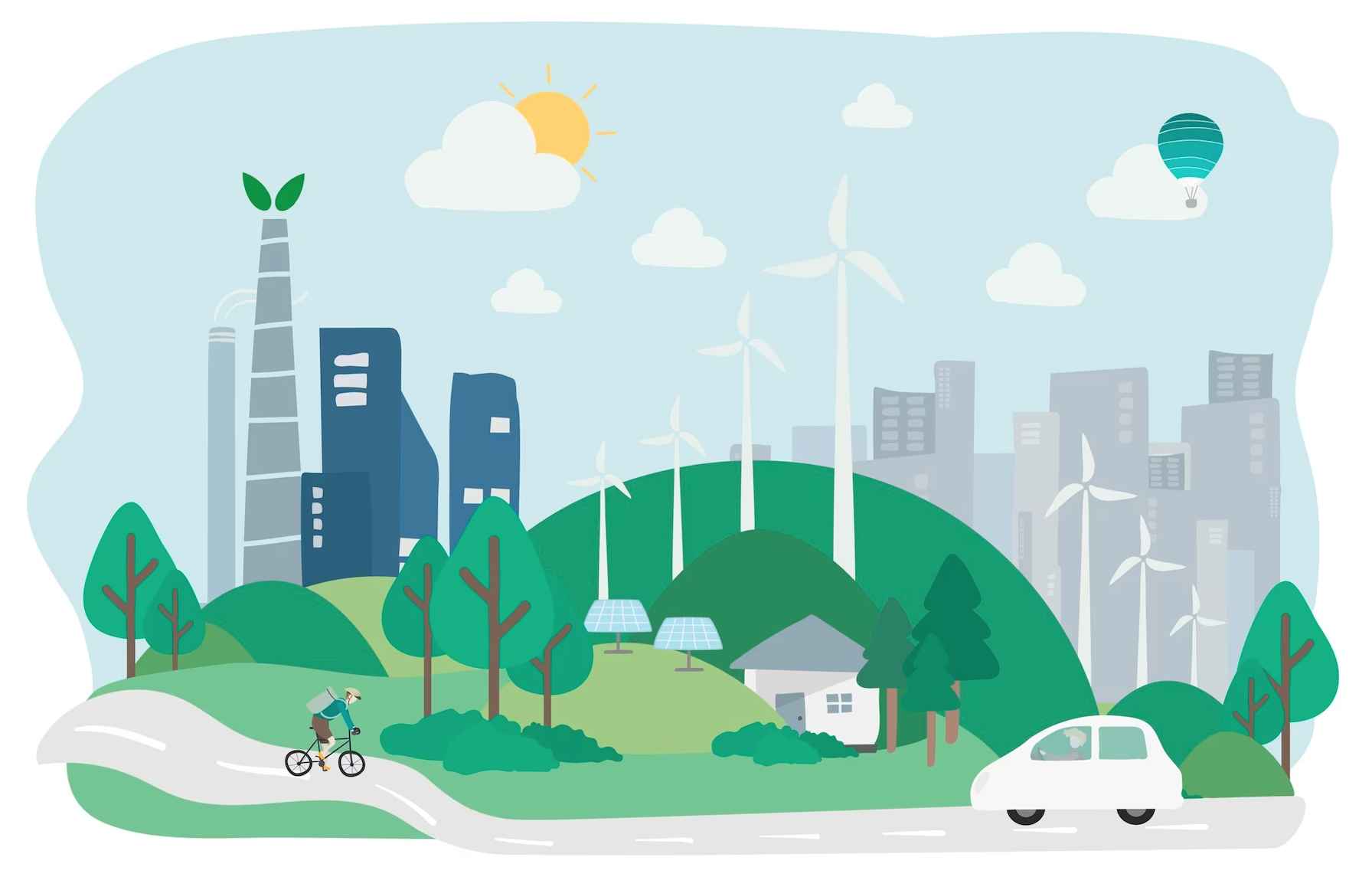India's Ambitious Journey Towards Net Zero Emissions: The Role of the Travel Industry
India, a nation of over 1.3 billion people, is embracing an audacious goal - achieving net zero emissions by 2070. This ambitious journey requires collective efforts from all sectors, including the travel industry. As the world's third-largest emitter of greenhouse gases (GHGs), India's transition to a sustainable, low-carbon economy is crucial in combating climate change. In this article, we explore the net zero ambition of India and the significant contributions the travel industry can make to support this national endeavour.
India's Net Zero Ambition
In November 2021, India declared its ambitious plan to achieve net zero emissions by 2070 during the COP26 climate summit. This commitment signals a profound shift towards a sustainable future. To understand the scale of this challenge, let's examine India's current carbon footprint:
India's GHG Emissions (2019)
India's total GHG emissions stood at approximately 2.65 billion metric tons of CO2 equivalent, making it the world's third-largest emitter after China and the United States. These emissions contribute to around 7% of the global total.
While India's emissions are set to increase as it seeks to address economic growth and energy demands, the nation aims to peak emissions by 2030 and then rapidly reduce them. This approach aligns with the Paris Agreement's goal of limiting global warming to well below 2 degrees Celsius above pre-industrial levels.

Key Sectors Contributing to India's Emissions
To achieve net zero, India must address emissions from various sectors. The key contributors are:
Energy Sector
India's energy sector, particularly its reliance on coal for electricity generation, remains a major source of emissions, accounting for nearly 75% of its power mix. The country is making strides in renewable energy, with a target of reaching 450 gigawatts (GW) of renewable energy capacity by 2030.
Transportation
India's transportation sector is witnessing rapid growth, contributing significantly to emissions. Road traffic, in particular, is a major source of GHGs. The aviation and shipping industries are also prominent contributors.
Agriculture
Agriculture is a crucial sector for India's economy and livelihoods, but it also contributes significantly to GHG emissions. Methane emissions from livestock and rice paddies are the primary concern.
The Travel Industry's Role in India's Net Zero Journey
The travel industry, encompassing aviation, tourism, and hospitality, can be a powerful force in India's transition to net zero emissions. Let's explore how this industry can contribute:
1. Sustainable Aviation: Paving the Skies for a Greener Future
As the aviation industry continues to soar, so do the concerns about its environmental impact. Air travel is a significant contributor to greenhouse gas emissions and climate change. However, the industry is now on a transformative journey towards sustainability, driven by innovations, regulations, and a growing commitment to greener practices. Let's explore the concept of sustainable aviation and the multifaceted efforts being made to create a more environmentally responsible future for air travel.

Understanding Sustainable Aviation
Sustainable aviation, also known as eco-aviation or green aviation, is a holistic approach that seeks to minimise the environmental footprint of the aviation industry. It encompasses various strategies and technologies aimed at reducing greenhouse gas emissions, conserving natural resources, and mitigating the impact of air travel on the planet.
The Challenges
The aviation industry faces several sustainability challenges that must be addressed to achieve a greener future:
Carbon Emissions: Aircraft engines burn fossil fuels, releasing carbon dioxide (CO2) and other greenhouse gases into the atmosphere, contributing to global warming.
Noise Pollution: Aircraft noise affects local communities around airports, impacting health and quality of life.
Land Use: Expanding airports and infrastructure can lead to habitat destruction and loss of biodiversity.
Waste Management: Air travel generates significant waste, including food containers, single-use plastics, and other materials.
Water Usage: Aircraft operations require vast amounts of water, impacting local water resources.
Innovations and Sustainable Practices
Biofuels: Sustainable aviation fuels (SAF), derived from renewable sources like algae, waste oils, and crops, have lower carbon footprints compared to traditional jet fuels. Airlines are gradually incorporating SAF into their operations to reduce emissions.
Electric and Hybrid Aircraft: The development of electric and hybrid-electric aircraft holds promise for short-haul flights. These aircraft produce fewer emissions and have the potential to revolutionise regional travel.
Aerodynamics and Lightweight Materials: Improving aircraft design and using lightweight composite materials reduce fuel consumption and emissions.
Air Traffic Management: Modernising air traffic control systems to optimise flight paths and reduce fuel burn is crucial for sustainability.
Sustainable Airport Infrastructure: Green building designs, energy-efficient technologies, and renewable energy sources can help airports become more sustainable.
Regulations and Industry Commitments
International Civil Aviation Organization (ICAO): The UN agency sets global standards for aviation emissions, and its Carbon Offsetting and Reduction Scheme for International Aviation (CORSIA) aims to offset the industry's CO2 emissions.
Environmental Management Systems: Airlines and airports adopt environmental management systems to track, measure, and improve their sustainability performance.
Carbon Neutrality and Net Zero Goals: Many airlines and airports have committed to achieving carbon neutrality and net-zero emissions by specific target years.
Challenges and Opportunities Ahead
While significant progress has been made, sustainable aviation faces challenges:
Scale and Cost of Sustainable Technologies: Scaling up sustainable aviation fuels and electric aircraft while maintaining cost competitiveness remains a hurdle.
Infrastructure and Policy Support: Developing charging infrastructure and implementing supportive policies are essential for electric aviation.
International Cooperation: Since air travel is global, international cooperation is crucial for harmonising sustainability efforts.
Sustainable aviation is an ambitious goal that requires collaboration, innovation, and determination from all stakeholders. As the world strives for a greener future, the aviation industry is taking meaningful steps to reduce its environmental impact. From investing in new technologies to adopting green practices, sustainable aviation is on a trajectory towards a more eco-friendly and responsible future of air travel. By continuing to embrace sustainability and engaging in collective efforts, the aviation industry can lead the way in mitigating climate change while still connecting people, cultures, and economies across the globe.
2. Eco-Friendly Accommodations: Paving the Way to Sustainable Hospitality
In the pursuit of India's net zero ambition, the hospitality industry has a pivotal role to play. As travellers increasingly seek eco-conscious experiences, the demand for sustainable accommodations is on the rise. Eco-friendly accommodations offer a unique blend of comfort, luxury, and environmental stewardship, making them an attractive choice for responsible travellers. In this section, we delve deeper into the concept of eco-friendly accommodations and explore the various practices that can drive sustainability in the hospitality sector.

Defining Eco-Friendly Accommodations
Eco-friendly accommodations, often referred to as "green hotels" or "eco-lodges," are hospitality establishments that prioritise environmental sustainability and social responsibility. These accommodations take proactive measures to minimise their ecological footprint, conserve natural resources, and foster positive social impacts on local communities.
Key Features of Eco-Friendly Accommodations
Green Building Standards
Eco-friendly accommodations are designed and constructed with sustainability in mind. They adopt green building practices to reduce energy consumption and waste. Utilising eco-friendly materials, such as sustainable wood, low-VOC paints, and energy-efficient lighting, contributes to a lower carbon footprint.
Energy Efficiency
Implementing energy-efficient technologies and practices is a cornerstone of eco-friendly accommodations. This includes the use of smart thermostats, energy-efficient appliances, and motion-sensor lighting to minimise energy consumption and reduce greenhouse gas emissions.
Water Conservation
Eco-friendly accommodations prioritise water conservation through various means, such as low-flow showerheads, dual-flush toilets, and rainwater harvesting systems. By reducing water usage, these establishments help preserve a precious natural resource.
Waste Reduction and Recycling
Minimising waste generation and promoting recycling are integral aspects of sustainable hospitality. Eco-friendly accommodations implement waste segregation and recycling programs to divert materials from landfills and promote circular economy practices.
Sustainable Food Practices
Responsible dining options are a hallmark of eco-friendly accommodations. These establishments often source locally-produced, organic, and seasonal ingredients to reduce food miles and support local farmers. Some may even have on-site organic gardens or participate in community-supported agriculture initiatives.
Community Engagement
Eco-friendly accommodations actively engage with local communities to promote sustainable livelihoods and cultural preservation. Supporting local artisans and incorporating indigenous elements into the accommodation's design and decor showcases the region's heritage.
Certifications and Accreditations
To demonstrate their commitment to sustainability, many eco-friendly accommodations seek certifications and accreditations from recognized organisations like LEED (Leadership in Energy and Environmental Design) and Green Globe. These certifications validate their environmental performance and help travellers make informed choices.
The Growing Appeal of Eco-Friendly Accommodations
The increasing awareness of environmental issues and climate change has prompted travellers to seek meaningful and responsible travel experiences. Eco-friendly accommodations offer a way for conscientious travellers to contribute positively to the environment and local communities while enjoying a comfortable stay. Studies show that travellers, especially millennials and Gen Z, are willing to pay a premium for eco-friendly accommodations that align with their values.
As India progresses towards its net zero ambition, the hospitality industry's adoption of sustainable practices is critical. Eco-friendly accommodations showcase a harmonious coexistence between luxurious experiences and environmental stewardship. By prioritising green building standards, energy efficiency, water conservation, waste reduction, sustainable food practices, and community engagement, these establishments lead the way towards a more sustainable future. As travellers, we have the power to support and encourage the growth of eco-friendly accommodations by making responsible choices and endorsing sustainable travel practices. Together, let's embark on a journey where every stay becomes an opportunity to promote sustainability, preserve nature's beauty, and build a brighter, greener future for India and the world.
3. Promoting Responsible Tourism: A Pathway to Sustainable Travel
As globetrotters, our adventures can have a profound impact on the world around us. In an era where climate change and environmental degradation are pressing concerns, responsible tourism offers a solution to create positive change while indulging in our wanderlust. Let's delve into the essence of responsible tourism and explore how each traveller can play a part in preserving our planet and fostering cultural exchange.

Understanding Responsible Tourism
Responsible tourism, also known as sustainable tourism, is a mindful approach to travel that seeks to minimise negative impacts on the environment, culture, and local communities. It embraces a triple-bottom-line approach, where the well-being of the environment, society, and economy are equally valued. The essence of responsible tourism lies in leaving a destination better than we found it, ensuring its beauty and culture endure for generations to come.
Principles of Responsible Tourism
Respect Local Cultures
Embrace the diversity of cultures you encounter during your travels. Learn about local customs, traditions, and etiquette to show respect and appreciation for the communities you visit.
Minimise Environmental Impact
Reduce your carbon footprint by opting for eco-friendly accommodations, using public transportation, conserving water, and supporting businesses that prioritise sustainability.
Support Local Economies
Seek out locally-owned businesses, artisans, and eateries to contribute directly to the economic development of the destination. Purchase locally-made souvenirs to support local craftsmanship.
Engage in Meaningful Experiences
Choose activities that celebrate and preserve the natural and cultural heritage of the destination. Participate in community-based tourism initiatives and conservation efforts.
Responsible Wildlife Encounters
Opt for responsible wildlife tourism that prioritises animal welfare and conservation. Avoid activities that exploit or harm animals for entertainment.
Minimise Waste and Plastic Usage
Dispose of waste responsibly and minimise single-use plastic consumption. Carry reusable water bottles, bags, and utensils during your travels.
Educate and Inspire
Share your responsible travel experiences with others to inspire a positive change in travel behaviours. Encourage friends and family to adopt responsible tourism practices.
Impactful Steps Towards Responsible Tourism
Travel with Eco-Conscious Tour Operators: Choose tour operators that prioritise responsible tourism practices and sustainability. Look for certifications or affiliations with recognized sustainability organisations.
Volunteer for Conservation Projects: Consider participating in conservation projects, beach cleanups, or community development initiatives during your travels to give back to the destinations you visit.
Offset Your Carbon Footprint: Support carbon offsetting programs to counteract the greenhouse gas emissions generated from your travels. These programs invest in renewable energy and reforestation projects.
Respect Local Wildlife: Observe animals in their natural habitats from a safe distance and avoid feeding or touching them. Choose wildlife experiences that prioritise conservation and ethical practices.
Responsible Diving and Snorkeling: Be mindful of coral reefs and marine life when engaging in water activities. Avoid stepping on coral or disturbing marine creatures.
Responsible Trekking and Hiking: Stick to marked trails to avoid damaging fragile ecosystems. Carry all waste back with you and avoid littering.
Support Sustainable Accommodations: Stay in eco-friendly accommodations that promote sustainable practices, such as energy efficiency, waste reduction, and water conservation.
Embracing responsible tourism is not only an ethical choice but a collective responsibility towards the planet and its inhabitants. By being mindful of our travel choices, supporting sustainable practices, and respecting the destinations we visit, we can create a positive impact that reverberates far beyond our journeys. Responsible tourism empowers us to become ambassadors of change, leaving a trail of positivity, respect, and appreciation for the diverse world we explore. Together, let's embark on a path of responsible tourism, where every adventure becomes a catalyst for a brighter, greener, and more inclusive future.
4. Promoting Responsible Tourism: A Pathway to Sustainable Travel
As globetrotters, our adventures can have a profound impact on the world around us. In an era where climate change and environmental degradation are pressing concerns, responsible tourism offers a solution to create positive change while indulging in our wanderlust. Let's delve into the essence of responsible tourism and explore how each traveller can play a part in preserving our planet and fostering cultural exchange.
Understanding Responsible Tourism
Responsible tourism, also known as sustainable tourism, is a mindful approach to travel that seeks to minimise negative impacts on the environment, culture, and local communities. It embraces a triple-bottom-line approach, where the well-being of the environment, society, and economy are equally valued. The essence of responsible tourism lies in leaving a destination better than we found it, ensuring its beauty and culture endure for generations to come.

Principles of Responsible Tourism
Respect Local Cultures: Embrace the diversity of cultures you encounter during your travels. Learn about local customs, traditions, and etiquette to show respect and appreciation for the communities you visit.
Minimise Environmental Impact: Reduce your carbon footprint by opting for eco-friendly accommodations, using public transportation, conserving water, and supporting businesses that prioritise sustainability.
Support Local Economies: Seek out locally-owned businesses, artisans, and eateries to contribute directly to the economic development of the destination. Purchase locally-made souvenirs to support local craftsmanship.
Engage in Meaningful Experiences: Choose activities that celebrate and preserve the natural and cultural heritage of the destination. Participate in community-based tourism initiatives and conservation efforts.
Responsible Wildlife Encounters: Opt for responsible wildlife tourism that prioritises animal welfare and conservation. Avoid activities that exploit or harm animals for entertainment.
Minimise Waste and Plastic Usage: Dispose of waste responsibly and minimise single-use plastic consumption. Carry reusable water bottles, bags, and utensils during your travels.
Educate and Inspire: Share your responsible travel experiences with others to inspire a positive change in travel behaviours. Encourage friends and family to adopt responsible tourism practices.
Impactful Steps Towards Responsible Tourism
Travel with Eco-Conscious Tour Operators: Choose tour operators that prioritise responsible tourism practices and sustainability. Look for certifications or affiliations with recognized sustainability organisations.
Volunteer for Conservation Projects: Consider participating in conservation projects, beach cleanups, or community development initiatives during your travels to give back to the destinations you visit.
Offset Your Carbon Footprint: Support carbon offsetting programs to counteract the greenhouse gas emissions generated from your travels. These programs invest in renewable energy and reforestation projects.
Respect Local Wildlife: Observe animals in their natural habitats from a safe distance and avoid feeding or touching them. Choose wildlife experiences that prioritise conservation and ethical practices.
Responsible Diving and Snorkeling: Be mindful of coral reefs and marine life when engaging in water activities. Avoid stepping on coral or disturbing marine creatures.
Responsible Trekking and Hiking: Stick to marked trails to avoid damaging fragile ecosystems. Carry all waste back with you and avoid littering.
Support Sustainable Accommodations: Stay in eco-friendly accommodations that promote sustainable practices, such as energy efficiency, waste reduction, and water conservation.
Embracing responsible tourism is not only an ethical choice but a collective responsibility towards the planet and its inhabitants. By being mindful of our travel choices, supporting sustainable practices, and respecting the destinations we visit, we can create a positive impact that reverberates far beyond our journeys. Responsible tourism empowers us to become ambassadors of change, leaving a trail of positivity, respect, and appreciation for the diverse world we explore. Together, let's embark on a path of responsible tourism, where every adventure becomes a catalyst for a brighter, greener, and more inclusive future.
India's net zero ambition is an inspiring call to action. The travel industry has a significant role to play in achieving this ambitious goal. By adopting sustainable practices, embracing green technologies, and promoting responsible tourism, the industry can become a catalyst for change. As travellers, we have the power to support this transformation by making eco-conscious choices and demanding sustainable options. Together, let's embark on a journey towards a greener, more resilient India for generations to come.
Sources
"India Greenhouse Gas Emissions: World Bank." data.worldbank.org
"India to Achieve Net Zero Emissions by 2070: COP26." indiatoday.in
"India's Energy Future." iea.org
"Carbon Footprint of Tourism." e-unwto.org
"Civil Aviation and Climate Change." icao.int
"Green Hotels and Eco-Lodges." unep.org
"Sustainable Tourism for Development." unwto.org
"Sustainable Hotels: Trends and Statistics." greenhotelier.org
"Eco-Lodges and Sustainable Tourism." unep.org
"Green Building Standards." usgbc.org
"Responsible Food Practices in Hospitality." sustainabletravel.org
"Community Engagement in Sustainable Tourism." unwto.org
"Eco-Friendly Hospitality Certifications." greenglobe.com
"UNWTO's Guidelines for Sustainable Development of Tourism." unwto.org
"Travel and Tourism: Economic Impact 2021 India." wttc.org
"Tourism and the Sustainable Development Goals." un.org
"Responsible Tourism: A Global Code of Ethics for Tourism." unwto.org
"The Global Sustainable Tourism Council." gstcouncil.org
"ICAO Carbon Offsetting and Reduction Scheme for International Aviation (CORSIA)." icao.int
"Sustainable Aviation Fuels (SAF) Fact Sheet." iata.org
"Sustainable Aviation: Towards Net Zero." sustainableaviation.co.uk
"Electric and Hybrid-Electric Aircraft: Current Status and Future Possibilities." intechopen.com
"Aviation and Environment: The Role of Government." oecd.org
Disclaimer: The data and statistics used in this article are based on publicly available sources as of the publication date. Figures and policies may change over time. Always refer to the latest official data and government reports for up-to-date information.



























































































































































































































































